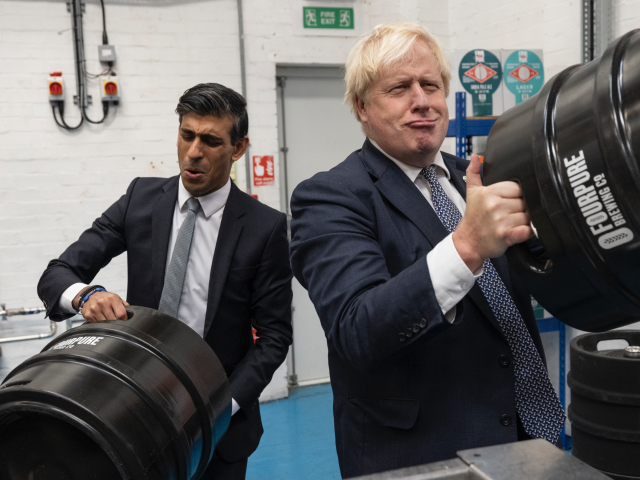The notionally conservative government of Prime Minister Boris Johnson will enact 25 per cent windfall tax on oil and gas companies to provide subsidies to the public after months of deriding the opposition-left Labour Party for proposing the very same measure.
Chancellor of the Exchequer Rishi Sunak announced that the government will impose a £5 billion windfall tax on energy firms in order to provide an addition £200 in energy cost savings to means-tested households in the UK.
“We will provide significant support to the British people… what this means in practical terms is that as we support people more we need to think about the fairest way to fund as much of that cost as possible,” Sunak told the House of Commons on Wednesday.
“The oil and gas sector is making extraordinary profits, not as the result of recent changes to risk taking or innovation or efficiency but as the result of surging global commodity prices driven in part by Russia’s war and for that reason I am sympathetic to the argument to tax those profits fairly,” he conceded.
Sunak said that there is a “sensible middle ground” on taxing energy firms, saying: “We should not be ideological about this, we should be pragmatic. It is both possible to tax extraordinary profits fairly and incentivise investment. And so like previous governments, including Conservative ones, we will introduce a temporary, targeted energy profits levy.”
High Inflation Could Last Years, Admits Former Central Bank Chief Economisthttps://t.co/Rqa5SUI9GK
— Breitbart London (@BreitbartLondon) May 10, 2022
The Chancellor said that the government has written into the legislation a sunset clause, meaning that the 25 per cent tax on profits will be phased out once profits return to a more historically normal level. He went on to say that the government will also offer a “new investment allowance” to oil and gas companies in order to incentivise the reinvestment of profits.
From the taxes gathered, some eight million low-income households will receive a one-time payment of £650, pensioners will receive a £300 handout, and previous subsidies for energy will be doubled to £400, which will no longer need to be repaid to the government.
The government handouts will fall well short of the increases in energy costs, however, with the nation’s energy regulator Ofgem announcing this week that it expects to once again raise the energy price cap in October. The regulator predicted that it will raise the threshold — a socialist price-cap initiative meant to keep down costs — to £2,800 this fall, up from £1,300 last October.
Despite describing themselves as low-tax “Thatcherite” conservatives, under the leadership of Prime Minister Boris Johnson and Chancellor Rishi Sunak, the Tory government has ushered in the highest tax burden on the public in seven decades.
In total, since coming into power in 2010 the Conservative Party has raised taxes on 1,034 occasions https://t.co/ZHxC806e1y
— Breitbart London (@BreitbartLondon) September 5, 2021
The decision to implement a windfall tax on oil and gas companies has long been derided by the Conservative leadership, with the PM himself mocking the left-wing Labour Party leader Sir Kier Starmer for suggesting it on Wednesday during Prime Minister’s Questions.
“There’s nothing original about a labor plan to tax businesses, nothing remarkable. They want to tax business the whole time, every day,” Johnson said.
The timing of the announcement is also questionable, as it follows the release of the Sue Gray Report into breaches of the lockdown restrictions by the Prime Minister and staff at Number 10 Downing Street on Wednesday, and the tax-and-spend cash giveaway may be giving the government a popular talking point to distract from the scandal.
While a windfall tax on oil and gas companies may prove popular in the short term, the impacts of such a tax may prove less desirable, with the costs likely to be passed onto consumers in the long term rather than from the pockets of high-paid executives. Indeed, petrol and diesel prices, which have already hit record highs of £6.44 ($8.12) and £6.85 ($8.64) respectively on Wednesday may climb again on the imposition of the tax.
There have also been warnings that the government handouts will also serve to increase inflation, which has already hit a 40-year high of nine per cent this month.
The director of the Institute for Fiscal Studies Paul Johnson said on Thursday: “I do think we need to be careful… Putting tens of billions into the economy at a time of high inflation could stoke additional demand and make the inflation much more permanent in the economy.”
Cost of Living Crisis: UK Inflation Climbs to 40-Year High of 9 Per Centhttps://t.co/kUeBKoGXNo
— Breitbart London (@BreitbartLondon) May 18, 2022
Follow Kurt Zindulka on Twitter here @KurtZindulka

COMMENTS
Please let us know if you're having issues with commenting.